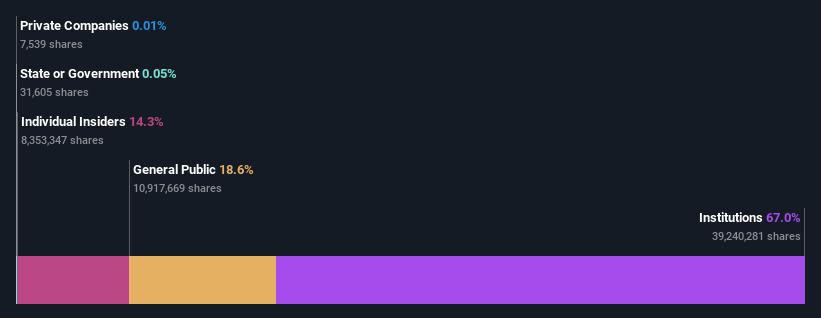Super Micro Computer, Inc.'s (NASDAQ:SMCI) high institutional ownership speaks for itself as stock continues to impress, up 13% over last week
Key Insights
Given the large stake in the stock by institutions, Super Micro Computer's stock price might be vulnerable to their trading decisions
A total of 14 investors have a majority stake in the company with 50% ownership
Every investor in Super Micro Computer, Inc. (NASDAQ:SMCI) should be aware of the most powerful shareholder groups. The group holding the most number of shares in the company, around 67% to be precise, is institutions. That is, the group stands to benefit the most if the stock rises (or lose the most if there is a downturn).
And last week, institutional investors ended up benefitting the most after the company hit US$61b in market cap. The gains from last week would have further boosted the one-year return to shareholders which currently stand at 897%.
In the chart below, we zoom in on the different ownership groups of Super Micro Computer.
View our latest analysis for Super Micro Computer
What Does The Institutional Ownership Tell Us About Super Micro Computer?
Institutions typically measure themselves against a benchmark when reporting to their own investors, so they often become more enthusiastic about a stock once it's included in a major index. We would expect most companies to have some institutions on the register, especially if they are growing.
We can see that Super Micro Computer does have institutional investors; and they hold a good portion of the company's stock. This suggests some credibility amongst professional investors. But we can't rely on that fact alone since institutions make bad investments sometimes, just like everyone does. If multiple institutions change their view on a stock at the same time, you could see the share price drop fast. It's therefore worth looking at Super Micro Computer's earnings history below. Of course, the future is what really matters.
Investors should note that institutions actually own more than half the company, so they can collectively wield significant power. We note that hedge funds don't have a meaningful investment in Super Micro Computer. BlackRock, Inc. is currently the largest shareholder, with 11% of shares outstanding. Meanwhile, the second and third largest shareholders, hold 9.1% and 8.4%, of the shares outstanding, respectively. Charles Liang, who is the second-largest shareholder, also happens to hold the title of Chief Executive Officer.
A closer look at our ownership figures suggests that the top 14 shareholders have a combined ownership of 50% implying that no single shareholder has a majority.
Researching institutional ownership is a good way to gauge and filter a stock's expected performance. The same can be achieved by studying analyst sentiments. There are a reasonable number of analysts covering the stock, so it might be useful to find out their aggregate view on the future.
Insider Ownership Of Super Micro Computer
The definition of company insiders can be subjective and does vary between jurisdictions. Our data reflects individual insiders, capturing board members at the very least. Company management run the business, but the CEO will answer to the board, even if he or she is a member of it.
Insider ownership is positive when it signals leadership are thinking like the true owners of the company. However, high insider ownership can also give immense power to a small group within the company. This can be negative in some circumstances.
It seems insiders own a significant proportion of Super Micro Computer, Inc.. Insiders own US$8.7b worth of shares in the US$61b company. That's quite meaningful. It is good to see this level of investment. You can check here to see if those insiders have been buying recently.
General Public Ownership
With a 19% ownership, the general public, mostly comprising of individual investors, have some degree of sway over Super Micro Computer. This size of ownership, while considerable, may not be enough to change company policy if the decision is not in sync with other large shareholders.
Next Steps:
While it is well worth considering the different groups that own a company, there are other factors that are even more important. Case in point: We've spotted 4 warning signs for Super Micro Computer you should be aware of, and 2 of them can't be ignored.
If you are like me, you may want to think about whether this company will grow or shrink. Luckily, you can check this free report showing analyst forecasts for its future.
NB: Figures in this article are calculated using data from the last twelve months, which refer to the 12-month period ending on the last date of the month the financial statement is dated. This may not be consistent with full year annual report figures.
Have feedback on this article? Concerned about the content? Get in touch with us directly. Alternatively, email editorial-team (at) simplywallst.com.
This article by Simply Wall St is general in nature. We provide commentary based on historical data and analyst forecasts only using an unbiased methodology and our articles are not intended to be financial advice. It does not constitute a recommendation to buy or sell any stock, and does not take account of your objectives, or your financial situation. We aim to bring you long-term focused analysis driven by fundamental data. Note that our analysis may not factor in the latest price-sensitive company announcements or qualitative material. Simply Wall St has no position in any stocks mentioned.


